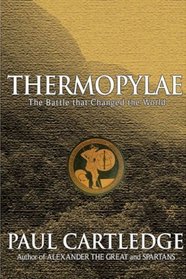For a book called "Thermopylae" I felt like there was remarkably little about the battle. The events of the battle are covered in a single chapter, in rather cursory fashion. Perhaps that is not the author's fault; Cartledge may have shared all that is actually known about the battle. But if he could not have given more details about the battle, it would have been good to get an idea of how the battle fit into the Greco-Persian war strategically and how it led to the eventual Greek victory. Instead, he leaps forward to Thermopylae as near myth and legend about Sparta and the image it created of Spartans. Interesting information in its own way, but it still felt as if the battle got short shrift.
What the book does have is quite a bit of information about the history and society of Sparta. It would appear that is where Cartledge's passions lie, and if you are interested in Sparta as it is both in history and legend, then this book should be quite interesting. (I understand that he wrote a book about Sparta, though, so perhaps that would be a better choice if Sparta is your interest).
The writing, however, is a bit clumsy, and at times strays into archaeological in-jokes. Cartledge also suffers from the expert's problem of wanting to convey too much information in too little space, resulting a book that lacks focus and is difficult to follow.
The key fault with this book, though, is that it is a very 'topical' book for a work on ancient history. There are several references to 9/11 and George W. Bush, for example, as well as parallels between the Spartan force at Thermopylae and suicide attackers. The comparisons and parallels felt both forced and dated by the time I read the book (2013), and I can't imagine that they will improve over time.
All in all, I found the book more disappointing than informative.
What the book does have is quite a bit of information about the history and society of Sparta. It would appear that is where Cartledge's passions lie, and if you are interested in Sparta as it is both in history and legend, then this book should be quite interesting. (I understand that he wrote a book about Sparta, though, so perhaps that would be a better choice if Sparta is your interest).
The writing, however, is a bit clumsy, and at times strays into archaeological in-jokes. Cartledge also suffers from the expert's problem of wanting to convey too much information in too little space, resulting a book that lacks focus and is difficult to follow.
The key fault with this book, though, is that it is a very 'topical' book for a work on ancient history. There are several references to 9/11 and George W. Bush, for example, as well as parallels between the Spartan force at Thermopylae and suicide attackers. The comparisons and parallels felt both forced and dated by the time I read the book (2013), and I can't imagine that they will improve over time.
All in all, I found the book more disappointing than informative.




